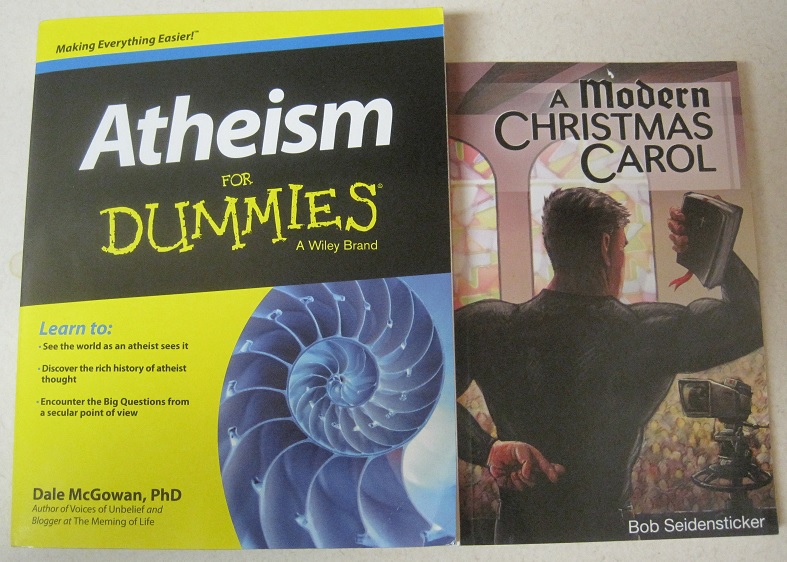I’m a bit behind on my book reviews (again), so here’s a post reviewing the two most recent that’ve come my way. As per my usual book review policy, I accepted review copies of both books, but no other compensation.
A Modern Christmas Carol by Bob Seidensticker
My Patheos colleague Bob Seidensticker has written a novelette, A Modern Christmas Carol, that adapts the Dickens story to advance a moral of rationalism. His Scrooge character is named Nathan Thorpe, an arrogant superstar televangelist who’s accumulated a massive fortune through his media empire, but who still grapples with private doubts about Christianity he hasn’t been able to suppress. Besides him, the other primary character is Thorpe’s secretary, Kay, who struggles with an abusive husband and a daughter with a chronic heart condition, both because of her boss’ teachings against divorce and abortion. There’s also an activist working for a religious accountability organization who’s pressuring Thorpe’s ministry to open its books, which he resists because of the vast wealth he’s selfishly accumulated.
You know how the old story goes, but Seidensticker has some fun with it. There are some nice touches, like how the Marley character, Thorpe’s old mentor Lloyd, has to spend eternity not wrapped in chains but burdened by the weight of all the worthless religious trinkets he used to give away through his ministry in exchange for donations. Another scene that works especially well is when the Ghost of Christmas Present takes Thorpe to see two of his donors: an ailing elderly couple, living in grinding poverty, who are persuaded by his televised sermons to give away much of the tiny amount of money they have.
It’s a brief but well-written book, taking just a few quick strokes to paint a remarkably realistic picture of the life of an alienated, arrogant TV preacher, and working in a surprisingly convincing set of arguments for atheism besides. (My favorite: “Why is faith necessary when that’s all a false religion would be based on?” [p.24])
On the other hand, I don’t want to put too much weight on what’s essentially an allegory, but I do have to say that the “Christmas Carol” motif, with its inherent supernaturalism, fits awkwardly with the book’s conclusion advocating rational skepticism. Even before his conversion, Thorpe is very matter-of-fact about his ghostly visitations, though you might expect a minister to wonder at least a little about how these beings fit into his theology.
Atheism for Dummies by Dale McGowan
My colleague Dale McGowan was approached by the publishers of the popular “For Dummies” series to write a book on atheism. If the “Dummies” imprint led you to expect a lightweight, cursory treatment of what atheism is, prepare to be surprised! Despite its cartoony layout, it’s actually a quite detailed look at atheism both ancient and modern.
McGowan begins by defining atheism and the many labels that cluster with it (deists agnostics, secular humanists, pantheists). He explains, gently but unapologetically, why atheists don’t believe in gods and lays out the positive values we do hold instead, including a detailed exploration of secular morality. He also briefly describes his own deconversion story.
The second part surveys atheism in the ancient world, following in the footsteps of authors like Jennifer Michael Hecht’s Doubt: A History. But McGowan’s treatment is remarkably thorough, and even covers some territory I haven’t seen before. He cites godlessness in some surprising places, including not just the requisite chapters on Greece, medieval Europe and the Enlightenment, but ancient India and China, even the Islamic world at the height of its imperial power and ambition. He names and quotes many freethinking personages throughout history, including some I didn’t know of and want to learn more about, like the ancient Chinese nontheist philosophers Xun Zi and Mencius, the Jain teacher Jinasena, the firebrand ex-Muslim theologian al-Rawandi, and the 20th-century Indian activist Gora. He even finds religious doubt in the Viking sagas of medieval Iceland. Following this, there’s a detailed summary of developments in the last hundred years, including the emergence of modern humanism in the 20th century, the growing ranks of the godless at the dawn of the 21st century, and the more recent rise of the New Atheist movement.
One thing I especially appreciated is that he devotes a whole chapter to the role of humor and satire in fomenting godlessness, a tactic that’s long deserved the prominent role it’s given here. He closes by citing some of the better-known atheist books for readers who want to find out more, as well as some of the prominent blogs and other internet references. (Full disclosure: He cites my blog among them, calling it “smart and thoughtful” and “one of the best voices in atheist opinion”. I’m blushing!)
All in all, I think this book more than stands on its own among works on atheist philosophy and history. So, let’s talk about that title. I have no idea whether it makes this book more or less likely to be read by the people who need to see it most; I can readily come up with arguments for both sides. What do you think?
